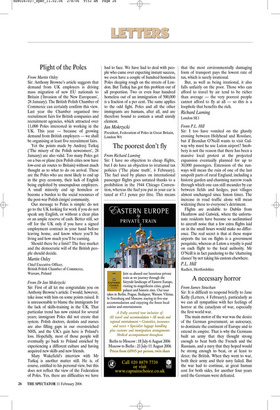Plight of the Poles
From Martin Oxley Sir: Anthony Browne’s article suggests that demand from UK employers is driving mass migration of new EU nationals to Britain (‘Invasion of the New Europeans’, 28 January). The British Polish Chamber of Commerce can certainly confirm this view. Last year the Chamber organised two recruitment fairs for British companies and recruitment agencies, which attracted over 11,000 Poles interested in working in the UK. This year — because of growing demand from British employers — we shall be organising at least five recruitment fairs.
Yet the points made by Andrzej Tutkaj (‘The misery of the Polish newcomers’, 28 January) are also valid. Too many Poles get on a bus or plane (ten Polish cities now have low-cost air routes to Britain) without much thought as to what to do on arrival. These are the Poles who are most likely to end up in the grey economy, their lack of English being exploited by unscrupulous employers. A small minority end up homeless or become a burden to the social resources of the post-war Polish émigré community.
Our message to Poles is simple: do not go to the UK looking for work if you do not speak any English, or without a clear plan or an ample reserve of cash. Better still, set off for the UK only if you have a signed employment contract in your hand before leaving home, and know where you’ll be living and how much you’ll be earning.
Should there be a limit? The free market and the democratic will of the British people should decide.
Martin Oxley
Chief Executive Officer, British Polish Chamber of Commerce, Warsaw, Poland
From Dr Jan Mokrzycki Sir: First of all let me congratulate you on Anthony Browne’s article. I would, however, take issue with him on some points raised. It is unreasonable to blame the immigrants for the lack of skills-training in the UK. That particular trend has now existed for several years; immigrant Poles did not create that system. Polish doctors, dentists and nurses are also filling gaps in our overstretched NHS, and the UK’s gain here is Poland’s loss. Hopefully, most of those people will eventually go back to Poland enriched by experiencing a different culture and having acquired new skills and new friends.
Mary Wakefield’s interview with Mr Tutkaj is another matter still. He is, of course, entitled to his personal view, but this does not reflect the view of the Federation of Poles. Yes, there are difficulties we have had to face. We have had to deal with people who came over expecting instant success, we even have a couple of hundred homeless Poles sleeping rough on the streets of London. But Tutkaj has got this problem out of all proportion. Two or even four hundred homeless out of an immigration of 500,000 is a fraction of a per cent. The same applies to the odd fight. Poles and all the other immigrants are humans, after all, and are therefore bound to contain a small unruly element.
Jan Mokrzycki
President, Federation of Poles in Great Britain, London W6














































 Previous page
Previous page